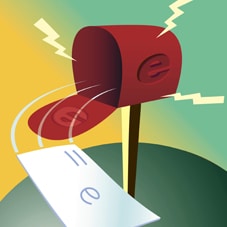If you’ve turned to the web to shop, reserve a hotel room or even sign up for a guest pass to your local gym, you’ve likely become a recipient of the vendors’ e-newsletters. From mega-corporations like Kellogg all the way down to one-person flower shops, businesses across a multitude of industries are spending big bucks on e-newsletter campaigns. The reason: E-newsletters are a highly efficient way for businesses to stay top-of-mind with members of their target markets.
Yet despite that, law firms have been slow to adopt this marketing strategy. In speaking with hundreds of lawyers, I’ve heard dozens of explanations for the reluctance. Quite often, solos and small firms say they just don’t have the time to produce and manage an effective e-newsletter campaign. For those who do have the resources, the overwhelming concern is a fear of violating the ethics rules with weekly or monthly e-blasts. With the right content, mailing list management and good software, however, you can lead an effective e-newsletter campaign that allows you to connect with contacts while carrying out your professional due diligence.
Advertisement or Solicitation?
To fully understand the various ethical considerations that come into play, it’s important to explore whether an e-newsletter campaign falls into the category of solicitation or advertisement. Of course, each state has its own rules and applicable ethics decisions, but since it’s not possible to cover each jurisdiction here, I’ll refer to the ABA Model Rules of Professional Conduct, which have been adopted in whole or in part by 49 states and the District of Columbia.
Advertising. Rule 7.2(a) states: “Subject to the requirements of Rules 7.1 and 7.3, a lawyer may advertise services through written, recorded or electronic communication, including public.”
The accompanying comment further explains that “lawyers should be allowed to make known their services not only through reputation but also through organized information campaigns in the form of advertising.”
Surely by this limited definition, it seems that e-newsletters composed of high-quality content on various topics pertaining to your area of law may constitute an organized informational campaign that may serve to educate contacts and members of your community. Provided that all information in the correspondence is not in any way false or misleading to a layperson — and the communication clearly identifies the firm or attorney, and the office location, responsible for the communication — it seems this form of marketing is permissible. But as with most matters of law and ethics … it depends. The major differentiation between an advertisement and solicitation is, of course, entirely dependent on the intended recipient.
Solicitation. Rule 7.3(1) states: “A solicitation is a targeted communication initiated by the lawyer that is directed to a specific person and that offers to provide, or can reasonably be understood as offering to provide, legal services.”
In contrast to advertising then, which is typically directed to the general public, solicitations are directed to individuals known to be in need of legal services (and not a contact of the attorney) and, in turn, come with greater restrictions to protect the public. So depending on the scope of your e-newsletter campaign, you may need to implement different systems and messages to meet your jurisdiction’s ethics requirements.
Managing Mailing Lists and Targeted Messages
Connecting with Clients, Colleagues and Contacts. If your e-blasts will only be sent to current and former clients, industry colleagues and contacts who have signed up to receive notifications from your firm, your e-newsletter isn’t likely to be considered a solicitation, even if the message is sent with a motive of pecuniary gain. Still, even though you may not be required to follow the strict guidelines set forth in Rule 7.3, it’s important that you take the following actions:
- Provide quality content. Advertising is permitted on the basis that it provides the public with information on legal services. With that in mind, it’s okay to be self-promotional at times, but it is not okay to limit your correspondence to self-promotion. Be sure to include information of value to your contacts, or you’re likely to generate more unsubscribers than referrals.
- Maintain clean mailing lists. You absolutely must include a way for contacts to unsubscribe from the mailing list and take action on such requests immediately. For the reputation of your email servers, it’s also important that you perform regular sweeps of your mailing list, removing outdated email addresses. A handful of advanced e-newsletter systems can help you perform these steps with minimal efforts.
- Read your local rules of professional conduct. Most states require that all advertisements contain the name of an attorney or firm responsible for the copy. Many others require that all advertisements contain a label indicating the collateral is a form of “advertising.” If your state mandates this type of labeling or a special disclaimer, be sure to include it prominently. Speaking of disclaimers, any time you share information on your legal services or area of law, it’s a good idea to explicitly state that it is not intended to be legal advice, even if your state doesn’t require it.
- Monitor replies. Most firms use a supplemental email address (e.g., news@mylawfirm.com) to send out e-newsletters. I do recommend this for a number of reasons, but it’s absolutely critical that this address be monitored for replies. Imagine a client receives the e-newsletter and replies with information regarding his case and you don’t act on it. Or, if the account won’t be monitored for whatever reason, be sure to include a note explicitly stating that recipients should not reply and instead provide them with an alternate email address.
- Keep a copy. While most states require firms to keep a copy of advertisements for a set period of time (usually anywhere from a year to seven years), it is good practice to keep it indefinitely. It’s digital and it only takes about a minute to save it to your local drive for safekeeping.
Connecting with Prospective Clients. While an attorney cannot solicit professional employment by in-person, live telephone or real-time electronic contact, comment (3) to Rule 7.3 states that “communications can be mailed or transmitted by email or other electronic means that do not involve real-time contact and do not violate other laws governing solicitations.” Attorneys can ethically send e-newsletters to prospective clients known to be in need of legal services provided that solicitation requirements are met. It’s important to note, too, that not all emails to prospective clients may qualify as a solicitation. If a prospective client has requested more information from your firm or signed up to receive your e-newsletter, informational e-blasts may qualify as advertisements.
Of course, if you are sending out an e-blast to prospective clients with whom you’ve had no prior communication and are simply doing so for pecuniary gain, you should be aware of the potential ethics issues, including these:
- Provide quality content. Just as with e-newsletters to contacts, it’s absolutely essential that the information in your email communication is completely truthful and delivers value to recipients. As you draft your copy, you must make sure the correspondence does not contain any language that might involve coercion or harassment or induce duress among recipients.
- If your list is purchased, you get just one shot. If you purchase a mailing list, you only get one shot at contacting the recipients so don’t just automatically add them to your standard distribution list. If you do not receive a response from given recipients, you should not contact them again. And it goes without saying that even if your list consists of opt-ins and prospective clients, if any recipients indicate that they do not wish to be contacted, you absolutely should not include them on any subsequent blasts.
- Labels are required. The ABA Model Rules require that the words “Advertising Material” be included at the beginning and end of any recorded solicitation communication. Your jurisdiction may require a different label in the body of your correspondence and in the Subject line so check before implementing any campaign. Similarly, other disclaimers to ensure that recipients do not construe the information as legal advice or a guarantee of outcome might be required.
- Monitor replies. Just as with advertisements, it’s important that replies to the blast are monitored in the event a recipient asks to be removed from your contact list or requests more information. If the account will not be monitored, you should clearly state that replies should be sent to an account that is checked regularly.
- Record (and submit) all correspondence. All advertisements and solicitations, including an e-blast, should be recorded and permanently stored. A handful of jurisdictions also require that a copy of solicitations be submitted to a local governing body at the time of dissemination. Be sure to check on these requirements before you kick off any e-newsletter campaign.
While e-newsletter campaigns do carry some risk, they also present a great opportunity to generate referrals, reconnect with past clients and engage prospects. To minimize the potential risk to your practice, make sure you develop a sound strategy that delivers value while addressing ethics concerns. And if you’re outsourcing the campaign, make sure all third-parties are familiar with your jurisdiction’s guidelines, and that an attorney at your firm has final say over all copy and mailing lists.
Fred J. Cohen is CEO of Amicus Creative Media, a leading website development and online marketing group for attorneys. His management and leadership experience spans across the information technology, legal and marketing sectors, from founding a tech startup that was acquired by a NASDAQ-traded company to practicing trusts and estates law as a partner at a Long Island firm.
Illustration ©ImageZoo.com

















